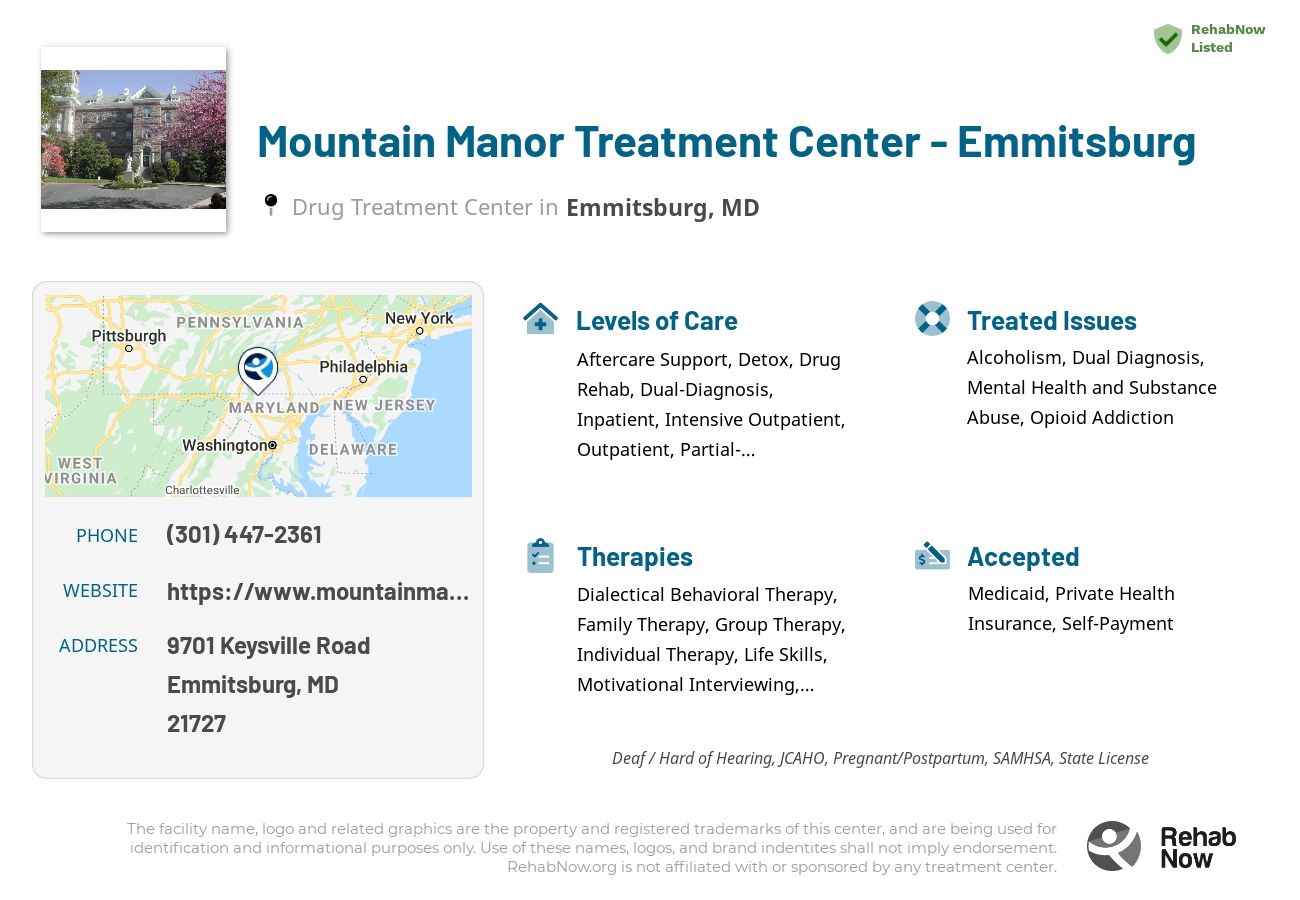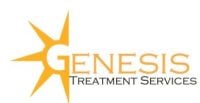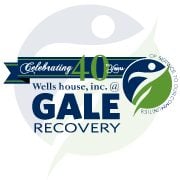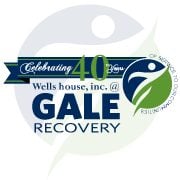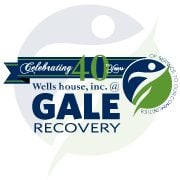Mountain Manor Treatment Center - Emmitsburg
Drug Rehab Center in Emmitsburg, Maryland
Maryland Treatment Centers - Mountain Manor at Emmitsburg in Emmitsburg, Maryland is an accredited treatment facility that offers various levels of care for alcoholism, dual diagnosis, opioid addiction, drug addiction, substance abuse, and mental health issues, and provides aftercare support.
About Mountain Manor Treatment Center - Emmitsburg in Maryland
Located in Emmitsburg, Maryland, Mountain Manor Treatment Center specializes in a comprehensive approach to overcoming addiction, including alcoholism, drug addiction, and dual diagnosis. With a capacity of 46 beds, this facility is notable for offering a wide range of services from medically monitored inpatient detoxification to partial hospitalization, all within a supportive and seasoned environment.
Mountain Manor Treatment Center prides itself on holding accreditations from the Joint Commission (JCAHO) and the Substance Abuse and Mental Health Services Administration (SAMHSA), ensuring high-quality care and adherence to stringent healthcare standards. This center integrates a variety of treatment levels to cater to individual needs, reinforcing its dedication towards customized and thorough recovery pathways.
- Wide Range of Services: Offers everything from intensive inpatient services to outpatient care, catering to different stages of recovery.
- Accredited Care: Certified by JCAHO and SAMHSA, ensuring treatment meets the highest standards of quality.
- Experienced Support: More than 40 years of experience in guiding individuals towards a meaningful recovery from addiction.
Maryland Treatment Centers - Mountain Manor at Emmitsburg specifically treats issues related to alcoholism, opioid addiction, drug addiction, substance abuse, and co-occurring mental health conditions. Their approach combines medically managed detox and intensive care with outpatient services and partial hospitalization, providing a holistic pathway to sobriety.
Genders
Ages
Modality
Additional
Accreditations
State License
SAMHSA

JCAHO
Conditions and Issues Treated
It’s not easy getting sober on one’s own, or even going to rehab and escaping the grasp of addiction by oneself. Substance abuse treatment gives addicts a place to stay sober while learning what it takes to quit for good. They will learn from others about what works and what doesn’t work with remaining drug-free.
Treatment centers such as Mountain Manor Treatment Center - Emmitsburg focus on the needs of individual addicts to heal them. There is a combination of physical and mental therapies that treat the root cause of the addiction, whether it be family problems, stress, or past traumatic events.
The final benefit of substance abuse treatment is introducing new people who can help in your recovery after you leave Mountain Manor Treatment Center - Emmitsburg. Through group therapy sessions with other addicts and attending support meetings once a day, a person will learn how to interact with others and cope with cravings. This is a chance for you to rebuild your social circle healthily after you leave treatment.
Opioid addiction starts when a person becomes addicted to legal or illegal opioids. The addiction can happen quickly, in just a matter of days. Opioid withdrawal can be extremely uncomfortable and lead the user to continue to use even if they want to quit. Stopping using an opioid requires medical observation. Sometimes inpatient treatment with a medically supervised detox is necessary for managing the withdrawal process while learning lasting tools for maintaining recovery. Medications may be used in some cases of opioid addiction.
Opioid addiction is one of Maryland‘s most prominent forms of addiction. It’s treated by detoxifying the body so that the chemicals from the medications no longer impact them and by therapies to correct behavior and target the root of the problem.
Recovery is not simply about stopping drug use. Recovery is working with addiction while recovering mental health issues that are fueling the addiction in the first place.
Levels of Care Offered
This center offers a variety of custom treatment tailored to individual recovery. Currently available are Aftercare Support, Detox, Drug Rehab, Dual-Diagnosis, Inpatient, Intensive Outpatient, Outpatient, Partial-Hospitalization, with additional therapies available as listed below.
Detox is the first step of rehab. It involves giving a person time to get the toxins out of their body. During detox, the patient gets ill and they will often start using again to get rid of these unpleasant feelings. That’s why it’s so important to have a Emmitsburg medical professional at Mountain Manor Treatment Center - Emmitsburg present. A Maryland medical professional will make sure patients don’t start using during detox. They will also provide medication to ease their symptoms and coach them through on a mental level.
Individuals who are suffering from severe addiction or have a high risk for dangerous health concerns are often recommended to receive inpatient treatment.
Choosing to enter an inpatient treatment program is beneficial for people who are suffering from severe addiction, or who have a high risk for dangerous health concerns.
Inpatient treatment is beneficial for:
- People who have a history of severe withdrawal.
- People who have attempted to overcome addiction on their own without success.
- People who have a history of relapse, or have recently relapsed.
- People at risk for drug overdose or withdrawal-related complications.
- People with medical conditions that are worsened by drug or alcohol use.
Addicts who need help with their addiction can enroll in an intensive outpatient program (IOP). But the patient won’t live there during treatment.
IOP involves patients visiting a medical office building regularly for therapy and other services while continuing to live their lives.
IOP is a step up from drug or alcohol detox, but it’s still a phase of recovery, not the end goal. Patients in need of IOP have many options for rehab and treatment.
Outpatient treatment is considered the lower intensity level of addiction treatment. It’s ideal for early phase addiction or lower intensity addictions. It may include weekly sessions instead of daily. It may include weekly sessions instead of daily. Peer group support, 12-step programs, and individual counseling may still be involved but at a lesser frequency than an intensive outpatient program. It is a good choice for someone who doesn’t need to go through a medically supervised detox and who has a supportive home environment. It requires motivation and dedication to commit to the program without constant monitoring.
PHP is a program where the individual is cared for in a hospital-like environment during the struggle of those symptoms, but still have some of the freedoms of an outpatient form of treatment. The individual may sleep at the facility each night, or they may sleep at home, but all have more monitoring than an outpatient treatment program typically offers. A PHP is able to live at home, attend school, work or perform other daily activities. This appeals to many families due to the ability of their loved one to still have some freedoms while also receiving treatment for their addiction.
Aftercare support should take place after outpatient treatment has ended. There are a few different types of aftercare support that patients can seek. These include 12 Step, Self-help groups (AA, NA), Therapeutic communities, Long-term, structured sober living arrangements, and Halfway houses (residential treatment centers).
Therapies & Programs
Individual therapy involves one-on-one sessions between the patient and therapist. It provides patients with a safe environment to openly discuss personal and sensitive issues with the therapist. They find the therapist as someone they can trust. Individual therapy aims to identify the core issues that would have led the patient to substance abuse and address them effectively. The therapist can develop patient-specific customized solutions through individual therapy, which aids speedier recovery.
Family therapy is a group problem-solving that aims to improve communication and relationships between the addict, their family, and sometimes friends. The main goal of family therapy for drug addiction is to create an environment where communication can occur without judgment, hostility, or blame. The therapist is with the family as they learn to communicate differently, especially with the addict when s/he is using. The family can learn to reduce their enabling behavior or rally together and support each other during tough times.
An addict’s family can play a vital part in helping them to avoid relapse because they can spot the warning signs and help them get back on track before it becomes too much of a problem. Family therapy is one of the most effective ways to help addicts stay on the path to long-term sobriety. When a drug addict decides that they want to try and get sober, it takes the support of every person they love to succeed. It can be incredibly difficult for loved ones to watch an addict go through the pain and suffering of withdrawal, but by being there with them and supporting them, they can help to make sure that the addiction never returns.
Groups typically involve meetings with other recovering addicts who can relate to one another’s experiences. They might meet in person or online and typically focus on the process of staying sober rather than overcoming a specific addiction.
In these groups managed by Mountain Manor Treatment Center - Emmitsburg, addicts can build a sense of community and develop strong emotional connections with others who understand what they are going through. These beneficial relationships can help addicts overcome their cravings and prevent relapse at any point during the recovery process.
In general, trauma therapy is a clinical process that helps individuals deal with mental stress often caused by traumatic events. The therapist helps the person identify, understand, and work through the problem. This is done with the help of talking about it in group or one-on-one counseling sessions. Therapists use relaxation, role-playing, art, and music to help the person open up about what is bothering them.
There are many different types of trauma therapists, such as psychiatric nurses and counselors. Not everyone is a good candidate for this type of therapy; it is generally reserved for people who have recently experienced a traumatic event and struggle to get over it. It is often done for children, teenage victims of sexual assault, and war veterans.
Dialectical Behavior Therapy (DBT) is a type of therapy created in the late 1980s and early 1990s to help people with high rates of suicidal behavior. DBT helps people learn how to live a life that is no longer controlled by overwhelming emotions and urges. It is beneficial in treating drug addiction because it helps patients understand and cope with their cravings for drugs or alcohol rather than turning to those substances as a way of coping.
There is hope for people who are addicted to drugs and alcohol. Cognitive Behavioral Therapy (CBT) is the solution. CBT focuses on the underlying thoughts and behaviors that caused the addiction problem in the first place and may cause a relapse. This type of psychotherapy addresses negative feelings common in substance abuse disorders. It helps to change them by restructuring thought patterns. It’s about removing negative thoughts and providing long-term benefits while promoting self-awareness, self-control, and healthy ways to respond to negative thoughts. These sessions can be done by themselves or as part of combination therapy.
REBT, or Rational Emotional Behavior Therapy, is a way of replacing negative thoughts with positive ones. It teaches people how to deal effectively with their unwanted habits and emotions. Some common problems people have are procrastination, unhealthy eating, and angry outbursts. Learning how to deal with these problems in a productive manner makes them less apt to come back.
Since addiction is a chronic physical and mental illness, addicts need to learn as many life skills as possible. Many drug treatment centers offer life skills activities as part of their addiction recovery programs. Examples include cooking classes, employment training, resume writing seminars, parenting classes, and computer training. Life skills activities help addicts find employment, take care of their families, and give back to the community.
Taking part in a 12-step program allows people to accept their addiction on their own terms. It divides the process into 12 steps and provides Mountain Manor Treatment Center - Emmitsburg [fields type=’wpwc pagename’] self-help without feeling rushed. <br>
Adherents to Alcoholics Anonymous follow “The Big Book,” which contains sobriety guidelines and offers support from peers who have faced similar challenges. Many drug users seek help from Narcotics Anonymous or Pills Anonymous.
Both NA and AA have 12 steps. They cover topics like admitting a problem, controlling the addiction, listening without judgment, making amends, and more.
Payment Options Accepted
For specific insurance or payment methods please contact us.
Is your insurance accepted?
Ask an expert, call (888) 674-0062
Mountain Manor Treatment Center Associated Centers
Discover treatment facilities under the same provider.
- Mountain Manor Treatment Centers - Baltimore in Baltimore, MD
- Mountain Manor - The Shoemaker Center in Sykesville, MD
- Mountain Manor Treatment Center - Emmitsburg (EBRG) in Emmitsburg, MD
- Mountain Manor Outpatient Services - Frederick in Frederick, MD
- Mountain Manor Outpatient Services - Carroll Plaza in Westminster, MD
Learn More About Mountain Manor Treatment Center Centers
Additional Details
Specifics, location, and helpful extra information.
Emmitsburg, Maryland 21727 Phone Number(301) 447-2361 Meta DetailsUpdated April 15, 2024
Staff Verified
Mountain Manor Treatment Center - Emmitsburg Patient Reviews
There are no reviews yet. Be the first one to write one.
Emmitsburg, Maryland Addiction Information
For the past decade, Maryland's rate of drug use and abuse has significantly increased. The overdose rate is currently higher than the national average. This epidemic is due to the many industries where manual labor is required. As soon as prescription opioids were more readily accessible a large part of manual workers started using–and eventually abusing–the painkillers.
Treatment in Nearby Cities
- District Heights, MD (62.1 mi.)
- Barstow, MD (89.1 mi.)
- Thurmont, MD (6.0 mi.)
- Pasadena, MD (57.1 mi.)
- Princess Anne, MD (135.3 mi.)
Centers near Mountain Manor Treatment Center - Emmitsburg
The facility name, logo and brand are the property and registered trademarks of Mountain Manor Treatment Center - Emmitsburg, and are being used for identification and informational purposes only. Use of these names, logos and brands shall not imply endorsement. RehabNow.org is not affiliated with or sponsored by Mountain Manor Treatment Center - Emmitsburg.





